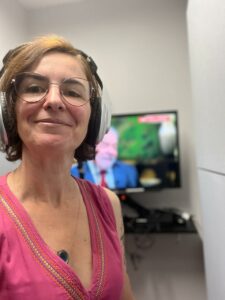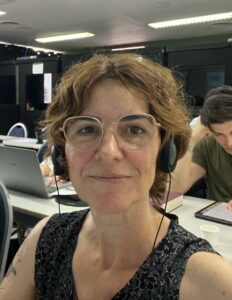DENISE BOBADILHA
Translation: Jeffrey D. Stewart
Revision: Lynnea Hansen, Todd Harkin

It’s difficult for certain words to be said. In fact, certain words should not even exist as they express the ugliest side of humanity. But, as professional interpreters who live and breathe words, we should know when to use them. Ever since CNN Brasil made its debut in Brazil four years ago, I have interpreted, alongside my business partner Natalie Graue, a mélange of worldwide events for this news outlet—presidential elections and inaugurations, ceremonies for the Royal Family, space expeditions, COVID-19, natural disasters, the January 6th riots at the US Capitol, school shootings. And then, the war—or, should I say, wars.
Before Israel and Gaza (October 2023), there was Russia and Ukraine (February 2022) and the chaotic withdrawal of United States armed forces from Afghanistan (August 2021). Since our coverage of Afghanistan, we’ve found ourselves interpreting not merely the words but the raw emotions of reporters in combat zones and the anguish of those who’ve lost loved ones.
When the war started in Ukraine, we expanded our glossary significantly with military, diplomatic, and geopolitical terminology. We drew maps to assist us in the interpreting booth. Together with colleagues, many of whom we had convened to ensure around-the-clock readiness to go on the air, we worked in uninterrupted shifts.
Beyond interpreting reporters on the frontlines of the war, our duties spanned interpreting political speeches, NATO press conferences and pronouncements, discussions in the UN Security Council, and interviews with civilians, military personnel, and experts from a host of industries. There were many instances in which we resorted to relay interpreting (that is, having the original utterances in Russian or Ukrainian interpreted into English, for us to then render them into Portuguese). On TV, relay interpreting presents an additional challenge since we can’t have extended moments of on-air silence (while we’re waiting for the utterances to make sense). To avoid particularly long delays, the delivery must stay very close to the original.

Without knowing what would come next on the big screen and in our earphones, we interpreted many emotional and suspenseful moments. Maintaining a calm and steady voice amidst the chaos is challenging yet crucial not only for the clarity of the delivery but also for instilling trust in our audience.
When I started broadcasting the news of the conflict between Israel and Hamas, I had already had some experience under my belt with this type of coverage. Unfortunately, specific facts are repeated in all conflicts, and some parts of the glossary apply to them all. We stay on call for this type of coverage because we can be on the air at any given moment. Since CNN Brasil broadcasts CNN International’s programming, we have the advantage of having reporters all over the world—and it’s our job to interpret them, too.
We’ve developed a certain stoicism—devoid of personal bias or input—in presenting the facts, stowing away our feelings until after the cameras are turned off. Before becoming an interpreter, I was a journalist for over 20 years and I covered all kinds of stories, including cases of urban violence in São Paulo as a police reporter. In more serious cases, such as mass murders, I’ve learned that irrespective of language, certain words, however hard, need to be said, because they show us a world we cannot ignore. Helping to translate this world is an important mission, one that gives me great honor to champion.
DENISE BOBADILHA is an interpreter, translator, and journalist based in São Paulo, Brazil. She started interpreting in 2016 and joined the CNN Brasil team on day one (March 2020). She also takes assignments for other clients on topics like Public Policies, Communication & PR, Human Rights, Environment & Climate, Science, and Legal & Corporate Affairs. Her email address is denisebobadilha@gmail.com, and she is on Instagram and X as @denisebob.


Thanks for giving a sneak peek into what it’s like interpreting such delicate topics that touch us in more ways than one. I’m glad you stressed the need for impartiality and emotional distancing in the face of situations that can be gut wrenching for even the most stoic.